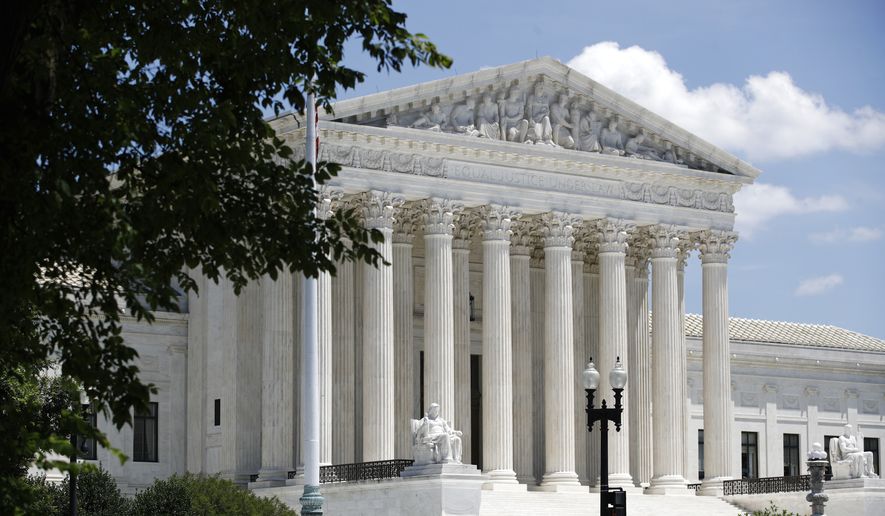President Trump said Wednesday the U.S. will “suffer greatly” if a court ruling against his tariff powers is allowed to stand. Mr. Trump asked the Supreme Court to strike down a federal appeals court ruling that said he overstepped by using a 1977 law to impose sweeping levies on imports from dozens of trading partners.
“Our country has a chance to be unbelievably rich again, but it could also be unbelievably poor again,” Mr. Trump said in the Oval Office. “If we don’t win that case, our country is going to suffer so greatly.”
The U.S. Court of Appeals for the Federal Circuit, in a 7-4 ruling Friday, said Mr. Trump unlawfully invoked the International Emergency Economic Powers Act, or IEEPA, to set nation-by-nation tariffs.
The court paused the effect of its ruling until Oct. 14, giving Mr. Trump time to appeal to the Supreme Court, where a conservative majority might look favorably on his application of the law.
The administration called on the high court to intervene quickly in a petition filed electronically late Wednesday.
Solicitor General D. John Sauer asked the justices to take up the case and hear arguments in early November.
SEE ALSO: Trump asks Supreme Court to quickly take up tariffs case after loss at appeals court
“That decision casts a pall of uncertainty upon ongoing foreign negotiations that the President has been pursuing through tariffs over the past five months, jeopardizing both already negotiated framework deals and ongoing negotiations,” he wrote. “The stakes in this case could not be higher.”
In the petition, Mr. Sauer said the IEEPA gives the president authority to impose the tariffs due to national security issues — like the flow of fentanyl, the trade deficit with other countries, and ongoing conflicts overseas.
He said the law allows Mr. Trump to “regulate importation” — meaning impose tariffs — on “‘any property in which any foreign country or a national thereof has any interest’ or ‘any property, subject to the jurisdiction of the United States.’”
“The power to ‘regulate importation’ encompasses the power to impose tariffs or duties on imports,” Mr. Sauer told the justices.
“The President and his Cabinet officials have determined that the tariffs are promoting peace and unprecedented economic prosperity, and that the denial of tariff authority would expose our nation to trade retaliation without effective defenses and thrust America back to the brink of economic catastrophe,” the petition read.
Earlier in the day, the president pushed for the tariffs to stick.
“I think we’re going to have a big victory,” Mr. Trump said during a White House meeting with Polish President Karol Nawrocki.
The recent ruling stemmed from a lawsuit filed by blue states and small, import-reliant businesses against Mr. Trump over his “Liberation Day” tariffs on dozens of nations. They said he usurped powers typically reserved for Congress by declaring a national emergency and claiming the right to impose tariffs on any country.
“It seems unlikely that Congress intended, in enacting IEEPA, to depart from its past practice and grant the President unlimited authority to impose tariffs. The statute neither mentions tariffs—or any of its synonyms—nor has procedural safeguards that contain clear limits on the President’s power to impose tariffs,” the circuit court said in its ruling.
Mr. Trump on Wednesday accused the small-business plaintiffs of being “foreign-oriented” and said the ruling, if upheld, would upend months of work to reset global trade relations.
“These deals are all done. I guess we’d have to unwind them,” Mr. Trump said. “I think it’s one of the most important cases I’ve ever seen go before the Supreme Court.”
Treasury Secretary Scott Bessent recently predicted victory in the case but said he is preparing a contingency plan, just in case.
The backup plan would likely involve using other tariff authorities that would pass legal muster, yet be more onerous for Mr. Trump to use.
For instance, Mr. Trump used a separate mechanism to impose sector-specific tariffs on products like steel, cars and aluminum, which were issued through a mechanism designed to protect national security.
Those tariffs were not impacted by the recent ruling.
Still, Mr. Trump said a loss before the Supreme Court would have widespread ramifications, including for U.S. coffers.
Tariffs have brought in more than $150 billion in tax revenue through U.S. customs so far this year, compared to roughly $60 billion around the same time last year.
Mr. Trump said tariffs could ostensibly be used as the chief revenue source instead of the income tax, as they were in the late 1800s.
“It’s possible, someday it’s possible,” Mr. Trump said.
Mr. Trump also said he needs tariffs as a negotiating tool with countries that want to send their products to the U.S. He said other nations are more likely to do his bidding if he threatens to cut off the rich American market.
“The tariffs are vital to the success of this country,” Mr. Trump said. “Other countries use them on us, but I just use them a lot better.”
Attorneys for the plaintiff businesses in the case said the tariffs are causing real harm. They predicted victory before the Supreme Court.
“Both federal courts that considered the issue agreed that IEEPA does not give the President unchecked tariff authority,” said Jeffrey Schwab, senior counsel and director of litigation at the Liberty Justice Center. “We are confident that our legal arguments against the so‑called ‘Liberation Day’ tariffs will ultimately prevail.”
• Alex Swoyer contributed to this article, which is based in part on wire service reports.
• Tom Howell Jr. can be reached at thowell@washingtontimes.com.




Please read our comment policy before commenting.